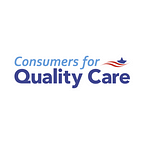Presidential Hopefuls: Cut Consumer Health Care Costs
By Jason Resendez, Consumers for Quality Care Board
Throughout the presidential campaign, candidates have devoted significant attention to health care — and for good reason. According to a recent Ipsos-Consumers for Quality Care (CQC) poll, health care continues to rank highest on a list of perennial concerns over retirement, housing, higher education and child care, regardless of party affiliation. As the Democratic presidential candidates prepare to take the stage for the fifth debate in Georgia, they must focus on cutting the high costs of health care squeezing consumers in the Peach State and across the country.
This year, CQC launched its #HealthCareFail campaign, which highlights the health care experiences of real consumers. These stories paint a clear picture: Anti-consumer practices employed by insurers, the lack of transparency in hospital pricing, and increasing out-of-pocket costs for prescription medications are major pain points for consumers across the country.
Right here in Georgia, we’ve heard stories of too many consumers struggling to afford the quality care they deserve. After a routine mammogram, Carrie from Georgia was hit with a surprise bill. Another Georgia consumer, Kim Lauerman, was distraught when her insurer denied a prescribed medication that would help prevent infections during chemotherapy to treat her ovarian cancer. She ended up getting an infection and had to cut her chemotherapy short.
Our system has become so opaque that the only thing consumers can predict about their out-of-pocket health care costs is that they are going up and becoming more complex. Take, for example, prior authorization, a fixture in many insurance plans that can have serious negative consequences for consumers. In fact, an American Medical Association (AMA) survey of 1,000 physicians found that 9 in 10 reported prior authorizations delayed access to necessary care. And, as more insurers institute policies that force consumers to pay for emergency room visits if the insurer later deems it a non-emergency, an increasing number of consumers are being forced to act as their own doctor or risk exorbitant medical bills.
To be fair, insurance isn’t the only segment of the health care system where consumer costs are going up. At the hospital, more than 50 percent of Americans have received a surprise medical bill in the past year for a cost they thought was covered by their insurance. Practices like balance billing and the widespread instances of billing errors are only exacerbating this problem. Vast variations in hospital pricing also make it incredibly difficult for consumers to determine what they might have to pay for care.
At the pharmacy counter, an increase in copay adjustment — or accumulator adjustment — programs where insurers no longer allow drug copay coupons to count towards patients’ deductibles is harming countless consumers. Older adults in particular have trouble affording medications, with 53 percent saying they are frustrated by out-of-pocket prescription drug costs.
In today’s health care environment, too many consumers are unable to afford quality care. Americans need leaders who will listen to folks like Carrie and Kim and make the changes needed to eliminate health care fails. Inaction is not an option for the countless Americans impacted by these fails annually.
Jason Resendez is a board member for Consumers for Quality Care and a health care strategist.
